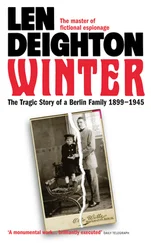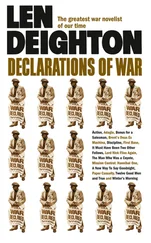The whole route was being decorated, but Whitehall and Parliament Square were coming in for special treatment. As well as hundreds of flags, there were heraldic shields bearing entwined hammer, sickle and swastika surmounting a small Cross of St George which had now replaced the Union Flag for all official purposes in the occupied zone.
Hitler had provided the Red Fleet with anchorages at Rosyth and Scapa Flow as well as Invergordon. Goebbels’s Propaganda Ministry said that this was a natural outcome of the bonds of friendship that drew these two great peoples together. Cynics said it was Hitler’s way of putting some Russians between him and the Americans.
In spite of all the extra work that the German/Soviet Friendship Week would give Scotland Yard, General Kellerman remained his usual genial unhurried self. Even when he returned from a conference at the Feld Kommandantur with a briefcase loaded with FK-Befehle he was able to laugh about the way these reams of printed orders about the Friendship Week required the full-time attention of a roomful of clerks.
The proliferating orders coming from the Military Commander GB (and the Military Administration Chief GB who supervised the British puppet government and the German officials) were a sign of growing fear that the Friendship Week might become the occasion for violent demonstration. And yet the intense rivalry – not to say hatred – that the German army Generals felt for Himmler’s SS organization, and police affiliates, determined the army to ask from General Kellerman no more than the normal police requirements.
‘What do you think?’ General Kellerman asked Douglas. ‘You can be quite frank with me, Superintendent, you know that.’
Kellerman spread out on his desk that morning’s newspapers. They all headlined the Friendship Week announcement from Berlin. There was a certain irony in the way that the official Nazi newspaper in London, Die Englische Zeitung , did little more than print the official announcement verbatim, within a decorative box on the front page. The Daily Worker , on the other hand, devoted four pages to it – ‘Britain’s Workers Say Forward’ with photos of the Russian and British officials who would be present at the saluting base. Stalin had already penned a suitable message. Those who remembered the congratulations Stalin sent to Hitler after the fall of France found his latest missive no less fulsome.
‘Will there be trouble?’ asked Kellerman.
‘From whom?’ said Douglas.
Kellerman chuckled. ‘The regime has enemies, Superintendent.’ He scratched his head as if trying to remember who they were. ‘And not all of them are on the General Staff.’ Kellerman smiled, enjoying his joke. Douglas was not sure whether he was expected to participate in this gross defamation of the German high command. He nodded as if not quite understanding.
‘There will be a lot of extra work for us,’ said Kellerman. ‘Berlin insists that the army line the entire route with soldiers. I should think there will be precious few left to march in the procession.’ He chuckled again. There seemed to be nothing to compare with the German army in trouble to put General Kellerman in a light-hearted mood. ‘And they plan to have Gendarmerie units every three hundred metres. How will they manage?’
‘And the Metropolitan Force?’
‘Normal police duties except for the issuing of movement passes.’
‘How will that work, sir?’
‘London Outer-Ring residents will be permitted to come into Central London each day for that week only. Local police stations will be issuing the passes, I’m afraid. Daily passes.’
Douglas nodded. It was easy to imagine the chaos that was going to descend upon suburban police stations. Half London had close relatives they could not visit because of the travel restrictions. ‘It would cut the work by half if the police stations could issue some passes for the whole week.’ Kellerman looked up and stared at him. Douglas added, ‘They would only be issued in the case of proved compassionate necessity.’
Kellerman looked at him for a long time before his face relaxed into a slight, inscrutable smile. ‘Of course, Superintendent. Only in the case of…what was it – proved compassionate necessity.’ Kellerman picked up the FK-Befehle and found the paragraphs referring to the issuing of passes. ‘I see no reason why I couldn’t introduce that provision into the orders.’ He smiled at Douglas. They both knew that this would provide a loophole, by means of which the local police stations would cut their workload drastically.
‘And the passes would make such splendid souvenirs,’ said Kellerman. ‘I’ll have a designer from the Propaganda Department work on it. Lots of decorations, with only the barest minimum of printing on the counterfoil.’
‘Yes, sir,’ said Douglas. That would be a way of preventing the Wehrmacht doing any proper analysis of the counterfoils.
‘None of this should affect you personally, of course, but I always value your views on these matters.’
‘Thank you, sir,’ said Douglas.
‘I know that your work with the Standartenführer is of special interest to the Reichsführer-SS. I’ve therefore taken it upon myself to excuse you all other duties.’
‘That’s very considerate, General.’
‘You look tired, Superintendent. I suppose you got to bed rather late?’
‘I haven’t been to bed at all, sir.’
‘Well, that’s dreadful! I can’t allow that. Not even a brilliant young officer such as Standartenführer Huth can be permitted to totally exhaust my officers. Especially one of the most able officers I have in my entire command.’
‘The General is most gracious and generous.’
Kellerman walked over to the tiny turret appendage of his room. ‘Have you seen that?’ Douglas followed him. They looked at Westminster Bridge; gangs of painters were colouring it gold. Red flags and swastikas were being fixed along a scaffolding some three metres tall. Douglas guessed that this was a means of concealing bridge, river and roadway; probably because it would be used to concentrate mobile Gendarmerie units on both road and river, ready to move to any trouble spot.
‘Do you like it?’ said Kellerman. Douglas recalled a quotation from the Classics about building for your enemies a golden bridge but decided against mentioning this to Kellerman.
‘I’m a Londoner,’ said Douglas. ‘I like things to stay the way they always have been.’
‘I like an officer who speaks his mind,’ said Kellerman. ‘I want you to remember, Superintendent Archer, that you are an important man here at Scotland Yard. Any suggestion, any complaint would carry a lot of weight with the people at the top.’ Kellerman got his humidor and opened it. This time he didn’t go through the ritual of lighting a cigar for him. Douglas had the idea that Kellerman was treating him differently from the way he’d been treated at all their previous meetings.
Kellerman waited while Douglas selected, cut and lit his own cigar. Then, when it was well alight, he said, ‘More influence than perhaps you realize, Superintendent Archer. Berlin congratulated us on the crime figures. You played a major part in those, you know.’
‘Only the homicide,’ said Douglas.
‘And who do you think reads beyond the murders? Police forces, and their commanders…’ he grinned and scratched his pink cheek, ‘are judged according to the proportions of murders solved. No one worries about the really important crime – fraud, sabotage, arson, robbery, blackmail and so on. No, they concern themselves with murder, the only crime seldom committed by criminals. So you chaps in the Murder Squad are damned important, and that’s why cunning old foxes, like me, make sure that the best detectives are assigned to homicide cases.’
Читать дальше












